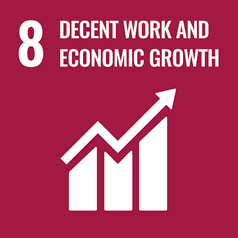More skilled people needed to continue Australia’s prosperity
As delegates meet this week for the Jobs and Skills Summit in Canberra, the role of the university sector in delivering a high-quality labour force through skills training, and boosting productivity comes into the spotlight.

The Summit presents an important opportunity to shape the way we address our nation’s economic and skills shortage challenges.
We need skilled people to keep pace with technology development and the changing nature of work. Otherwise, we risk falling behind others across the globe. Australia’s continued prosperity depends on having more skilled people.
Living regionally, the current skills shortage is felt even more acutely. Many communities are struggling with a lack of skilled staff.
We know that tertiary education has a direct correlation to thriving economies, helping people secure well paid jobs, and building the skilled workforce that promotes innovation and economic growth.
In fact, the National Skills Commission estimates that 9 in 10 jobs over the next five years will require either a TAFE or university qualification.
Prime Minister Albanese recently remarked that the top in-demand professions over the same five-year period will include construction managers, civil engineers, early childhood teachers, nurses, ICT systems analysts, software and applications programmers, electricians, chefs, child care workers, and aged and disability care workers.
This is good news for people who are thinking of studying at university.
At the University of Newcastle, not only do we have degrees on offer in the majority of these areas – but what’s clear is that once a student graduates, there will be jobs available in their field of study.
The other big sector that is anticipated to see increased growth are jobs in Science, Technology, Engineering and Maths (STEM), which are predicted to grow twice as fast as non-STEM jobs.
Typically, these jobs are heavily linked with new and developing industries, especially as Australia transitions to a net-zero economy in the coming decades… Think jobs in renewables and energy storage such as novel batteries, or the digital transformation of traditional manufacturing sectors into areas such as medical devices.
The Hunter is well placed to meet the demands of a new economy and the mega-trend industries that will shape our regional economy for the next 10 to 20 years.
For example, we are working with our industry partners, including the Port of Newcastle, to help set up our region to become a hub of hydrogen innovation – a producer, user and exporter of hydrogen to the world
Historically, our region has been the engine room for energy resources and production in New South Wales, and we have the skill base and infrastructure to meet the new demands for a green economy. There is more work to do. Your University has the innovation capabilities and the industry relationships needed to drive the future of the Hunter.
We’ve kept our finger on the pulse by introducing new degrees – adapting our programs and courses to meet the needs of industry and the economy.
Two great examples are our Bachelor of Climate Science and Adaptation, and Bachelor of Renewable Energy Engineering, which were introduced to meet the growing call for action on climate change through renewable energy. The degrees are designed to set our students up to progress into careers that span all sectors affected by the current and future impacts of climate variability.
The latest government data shows that over 90% of our undergraduate students find full time employment within four months of graduating. We want to encourage the next wave of students to enrol in areas of growing workforce need, to maintain our excellent employment outcomes for our graduates.
The Jobs and Skills Summit in Canberra has come at an important time for us all to have a conversation about the economic and skills challenges we face.
We must work together if we are to be ready for the changes ahead.
Be assured that the University of Newcastle is supporting our regions by offering options and opening our doors to anyone who is seeking to study or who is looking to earn a degree. We have a place for you, if you have the desire to study. By focusing on future needs, we are confident that the Hunter will have a job for you.
Professor Alex Zelinsky AO
Vice-Chancellor, University of Newcastle
Related news
The University of Newcastle acknowledges the traditional custodians of the lands within our footprint areas: Awabakal, Darkinjung, Biripai, Worimi, Wonnarua, and Eora Nations. We also pay respect to the wisdom of our Elders past and present.
